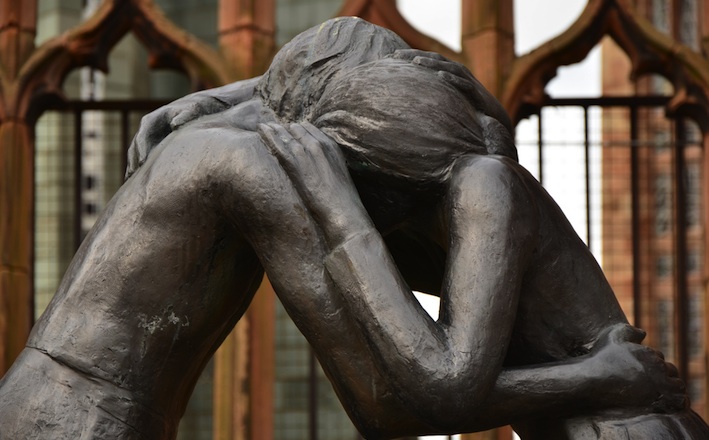Commentary on Ezekiel 33:7-11
Wickedness, sin, death, blood — this week’s selection from Ezekiel 33 can be a difficult and jarring read for those of us not overly familiar with the book of Ezekiel and its sometimes bizarre judgment speeches.
The selection also includes only the briefest snippet from chapter 33. We are left without much context — historical background, literary setting, theological understandings.
With this selection, it is as if we have joined the conversation mid-sentence.
So, how do we make sense of this portion of the overall conversation?
These five verses taken from deep within this prophetic book raise difficult questions about God’s judgment and forgiveness.
I have organized my comments below by asking four questions. In asking these questions, I am most interested in the roles of the prophet, the house of Israel, and the Divine within Ezekiel 33:7-11.
Our selection represents in some ways the (stereo)typical image of a Hebrew prophet: a mouthpiece of God consumed with sin and judgment, a fiery preacher calling attention to the wickedness all around, an itinerant ranting about transgressions. Indeed, many of the prophets do issues harsh judgments against the nation and people of Israel. (And we should not forget that they also offer words of comfort and hope to the people.)
But many times, the reason for the prophet’s emphasis on judgment relates to the need for repentance. The prophets hope to persuade the people to turn away from their wrongdoings and follow God and God’s teachings.
There is more to this passage than a simple call to repentance.
Ezekiel 33:1-20 forms the larger literary unit and consists of an oracle concerning a watchman. This image is used earlier in the book of Ezekiel for the prophet. As part of a prophetic commissioning, God appoints the “son of man,” Ezekiel, as a watchman or lookout or sentinel in Ezekiel 3:16-21. The image or metaphor is used in the book both to describe Ezekiel’s prophetic role — he is to warn people of coming danger — and to limit the prophet’s liability if the people do not listen.
The watchman’s responsibility lies in sounding the alarm and pronouncing the danger. The sentinel would have been stationed in a lookout position and sounded a trumpet upon sight of a threat. The watchman, however, is not responsible for the people’s response to the warning. He or she cannot force people to prepare for the threat, to defend the city militarily, to fortify the surroundings.
The watchman’s task is to announce impending danger.
The image of the watchman is particularly striking if we consider the literary context of the passage. The passage immediately after our selection, Ezekiel 33:21-22, contains a narrative report of the capture of Jerusalem by the Babylonians. This military intervention serves as a critical turning point in the book of Ezekiel given that the prophetic tone switches here from mostly judgment oracles to promise oracles in chapters 33-48. The occurrence of an image of the watchman just preceding this announcement already sets the tone for impending danger.
Our five verses include three references to “the house of Israel.” We are therefore clear about the communal and national recipient of these warnings. In fact, this collective recipient is able to respond in verse 10 to the divine speech with a question: “how then can we live?” This question, with its accompanying realization that their sins weigh upon them heavily, actually engenders the divine response (verse 11) that concludes this passage. The people of God have offered a complaint to which God now responds.
God’s intention is not for God’s people to die. While the house of Israel is surely threatened with death, God offers repentance and assurance that God takes no pleasure in the death of the wicked.
The danger in this passage is not an impending enemy attack as we might suppose from the metaphor of the watchman. In fact, the threat is not external. Instead, the role of the watchman is to relay to the people God’s impending, but not inevitable, judgment.
The last phrase of the last verse of our passage speaks of God’s final question to the house of Israel: “why will you die?” This question reframes the earlier inquiry from Israel: “how can we live?” It flips the earlier query on its head and emphasizes the consequence of wickedness (death).
Why would you choose death when you can be alive?
To choose to live is to choose to turn back from evil. This verb, “to turn” is used repeatedly in this passage as a reminder of the physical understanding of repentance.
In addition to its placement within the overall book of Ezekiel, the passage is also shaped liturgically by this Sunday’s reading from the Gospel, Matthew 18:15-20, a brief passage that speaks of church discipline. The gospel imperative to go to a fellow church member to point out a fault relates somewhat to the image in Ezekiel 33 of the prophet’s call to repentance and his role as a watchman.
The thematic connection between the passages actually stands loosely and at a broad level. Engaging the specifics of these passages creates some thematic distance between them. Perhaps one can note that in general forgiveness of sin is readily available in both stories.


September 7, 2014